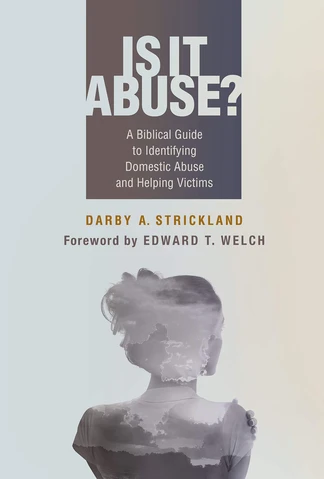
Darby A. Strickland
Reviewed by: Patterson, Smith
Is It Abuse? A Biblical Guide to Identifying Domestic Abuse and Helping Victims, by Darby A. Strickland. P&R, 2020. Paperback, 360 pages, $11.99. Reviewed by OP pastor Daniel F. Patterson.
Did you know that one in three women has lived through domestic abuse in her lifetime? Sadly, the statistics in the church are no better, and women in the church regularly report that their pastors and church leaders dismiss, minimize, and sometimes even cover up domestic abuse. Darby Strickland’s new book Is It Abuse? not only provides clear and comprehensive insights into the dynamics of domestic abuse, but is also a clarion call to the church and its officers to take abuse more seriously than it has. Is It Abuse? is intensely practical, stunning in scope, and gracious in tone.
The book has a three-fold goal of equipping helpers to: pick up on cues that something is wrong by outlining the dynamics of oppression; patiently draw out stories so helpers can get clarity on whether abuse is occurring; and provide Christ-centered counsel while navigating the complexities of abuse (16).
Strickland helps the reader understand oppression, uncover oppression, and then uphold the oppressed. Using the biblical language of oppression alerts the reader to the reality that when we talk about abuse, we are not simply describing physical abuse. In fact, the entire second part of the book gives church leaders and helpers the tools to assess whether physical, sexual, emotional, spiritual and/or financial abuse may be occurring in a relationship. This is accomplished through the use of at least nine inventories—lists of questions—that seek to assess everything from the entitlement mentality of abusers to the tactics that emotionally abusive spouses use to control their victims.
Foundational, however, to understanding oppression is the recognition that abuse occurs when “one spouse pursues their own self-interests by seeking to control and dominate the other through a pattern of coercive, controlling, and punishing behaviors” (24). Though oppression can take many forms, the goal of the oppressor is always the same: “to punish and wound a victim so that an oppressor gets their world the way they want it” (24). Oppressors are not, therefore, fundamentally out of control, but rather seek control by any means. Oppressors hurt not because they’ve been hurt, but because they want to shape their world exactly the way they want it to be and because they believe they are entitled to such a world (34). This means that oppression isn’t a marriage problem that can be remedied through marriage counseling. It is a control problem, a problem that says, “I demand. I am owed. I have the right to insist. What I want matters the most” (63). Simply put, oppressors have a worship problem.
Though Strickland spends many pages describing the dynamics of the oppressor, her heart is clearly for the oppressed because God’s heart is for the oppressed. In coming alongside the abused, Strickland encourages us to slow down and be patient. Most victims of abuse will not initially come to us pastors or elders for counsel about abuse, but rather for counsel about anxiety, depression, or even how to be a better spouse. Many victims know that something is not right, and they need people who will patiently sit with them and draw out their stories. Rushing to conclusions and solutions may very well push them back into a situation that is dangerous. Helping the oppressed navigate their abuse “is usually a slow and deliberate journey—one that cannot be rushed” (44).
It is hard to overestimate the contribution Strickland has made to the church in this volume. Saturated with biblical wisdom and years of experience, Is It Abuse? helps pastors, counselors, and laypeople understand the gut-wrenching dynamics of abuse and lead those who have been abused to rest and freedom. The church will no doubt be drawing from this book’s wisdom for many years to come.
*****
A second review of this book by Joseph W. Smith III may be found here.
June 15, 2025
June 08, 2025
June 01, 2025
Anxiety: Finding the Better Story
May 25, 2025
April 27, 2025
The Devoted Mind: Seeking God’s Face in a World of Distraction
April 20, 2025
April 13, 2025
© 2025 The Orthodox Presbyterian Church